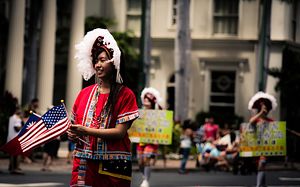To paraphrase Aaron Friedberg, former deputy national security advisor to Dick Cheney and professor of politics at Princeton, the Obama administration’s foreign policy pivot (or “rebalancing”) has looked more like an empty slogan than a strategy. The pivot has been a vague combination of policies cherry-picked from the Clinton and second Bush administrations. A recent article in the journal International Security provides one of the first clear-cut discussions of what the Obama administration’s pivot is designed to do: maintain the balance of power in Asia by preserving the influence of the U.S. and its allies in the region. One of the key components of the pivot was to reform the U.S. system of alliances in the Pacific “by increasing the military capabilities of allies and partners and building greater multilateral interoperability among them.” While the United States has been working to increase military-to-military cooperation between Japan and South Korea (as demonstrated by the recent Pacific Dragon exercise), a critical ally has unnecessarily been left out of the mix: Taiwan. It is time for another pivot – on Taiwan policy.
The potential for cross-strait conflict has bedeviled both Democrat and Republican presidents. Because we have legal, moral, and security commitments to the defense of Taiwan, China’s growing defense budget should give the United States cause for concern. One of the components of the Pivot was to reassure U.S. allies that we were not leaving the region. In the event of an attack on Taipei, America would be drawn into the conflict. Favorable shifts in the balance of power in Beijing’s direction are likely to destabilize the Straits and could draw us into a direct conflict with China. A second component of the Pivot was to have our Asian allies “act as hosts for forward-deployed forces.” As we are moving away from the Cold War system of purely bilateral alliances toward a more integrated pattern of alignment, we continue to unnecessarily exclude Taiwan from the security architecture of the region.
U.S. allies are a critical component of maintaining the current balance of power in Asia. Future power shifts can only be mitigated through burden-sharing and open communication with, and respect for, our allies. Taiwan is a mature market democracy whose geographic location alone demonstrates its military importance.
The journey to a new policy could begin with a few simple steps. One step the Congress is taking, the Taiwan Travel Act that I have proposed, is designed to foster open communication between U.S. decision-makers and their Taiwanese counterparts. High-level Taiwanese officials, specifically the president, vice president, minister for foreign affairs, and the defense minister are currently not allowed to meet with U.S. officials in Washington, D.C. This policy is insulting to our longstanding ally.
A second step could be to provide Taiwan with a presence at the United Nations. In 1971, Taiwan was forced to give its seat up to the People’s Republic of China. Since then, China has forced many countries to choose between relations with Beijing or Taipei. This has reduced Taiwan’s official diplomatic relations to 22 nations. Although China was willing to engage with Taiwanese President Ma Ying-jeou on a limited number of issues, the enthusiasm for cooperation has dissipated with the election of Tsai Ing-wen. If one of our goals is to reassure our allies in the region, we should advocate that they have a voice and a vote in international organizations, starting with the UN.
Third, it is necessary that Taiwan be integrated into the larger regional security architecture. As it currently stands, Taiwan is out in the cold. Plans must be developed to help improve its military effectiveness and include it in regional military exercises with our other allies.
This November a new U.S. president will be elected. Barack Obama came to office in 2008 promising to improve relations with our allies. However, at times he has seemed more interested in doing the opposite: abandoning our allies, tacitly allying with our adversaries, and capitulating to the demands of the most ruthless members of the international system. The next president needs to reset these policies. Managing the rise of China is likely to prove the biggest geopolitical challenge the United States will face in the 21st century. Improving our relationship with and status of Taiwan might be a good place to start.
Rep. Steve Chabot (R-OH) is the Chairman of the House Small Business Committee. He is a senior member of the House Foreign Affairs Committee and the House Judiciary Committee.

































